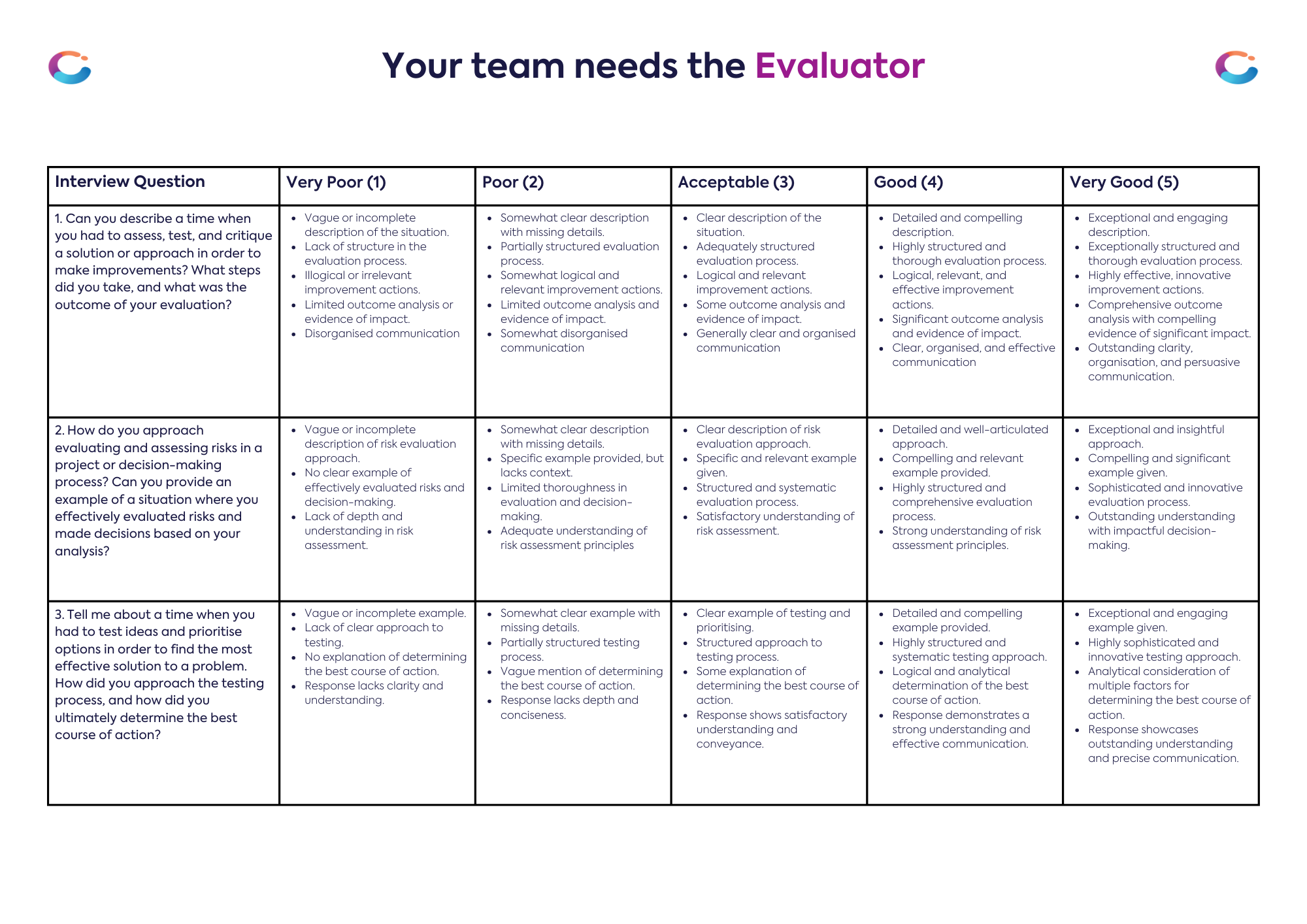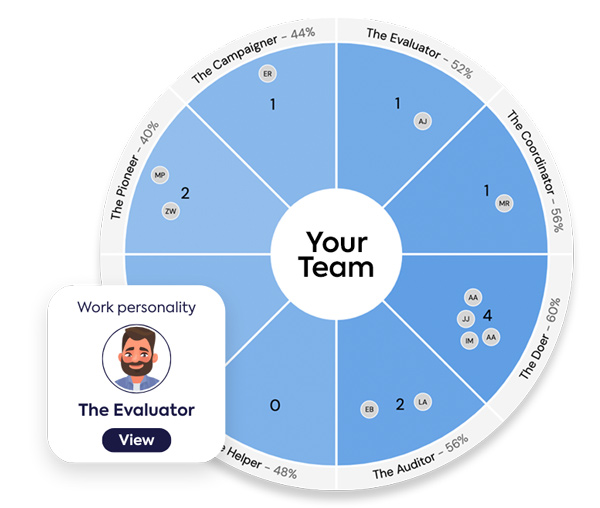Crafting interview questions with Work Personality insights
Ever sat through an interview and felt like you were pulling teeth trying to figure out if a candidate was the right fit? Or maybe you hired someone...
Become the expert on delivering
valid and fair assessments for
your training and education.
Hire
|
Engage
|
Develop
|
|
Automatically match to candidates who are a great fit for your team culture and who are intrinsically motivated to succeed. |
Deeply understand your organisation with science-backed analytics on your culture, team design, and engagement. |
Back your onboarding, compliance and skill development with industry-leading credentialling, competency and capability expertise.
|
Hey Compono helps you understand your personality and how to turn it into your superpower.
First 1,000 users get 10 minutes free.
Just $15 a month after that — cancel anytime.
4 min read
 Mathan Allington
Jul 11, 2025 5:35:32 PM
Mathan Allington
Jul 11, 2025 5:35:32 PM

Table of Contents
Ever walked out of an interview feeling unsure about how a candidate stacks up? Or worse, seen a hiring choice crumble when the new hire didn’t quite fit in?
Making the right call isn’t always easy—people are complex, and our gut instincts can sometimes deceive us. That’s why a structured scoring framework isn't just a nice-to-have; it’s essential to an efficient, fair, and objective hiring process.
Enter the scoring key, an invaluable tool for evaluating candidates through the lens of Work Personality insights.
Here’s how scoring keys work, why they’re so effective, and how you can start using them to make your hiring decisions smarter than ever.

A scoring key is like a roadmap for your hiring process. It’s a documented framework that allows you to rank candidates against specific traits and behaviours relevant to the role and team. Instead of relying on vague impressions, you can assign measurable scores to each area, ensuring consistency and objectivity across interviews.
When paired with insights into Work Personality—the traits and behaviours that influence how people work—you’ve got the perfect recipe for smarter, bias-free decision-making.
The idea is simple but powerful. Rather than guessing if a candidate seems "right," you assess how closely they align with the needs of the role and team using a structured and transparent process.
You might wonder if it’s worth spending time setting up a framework like this. But think of it as the difference between wandering into the shops without a list or going in with a game plan. A scoring key keeps you focused and consistent, avoiding hiring mistakes that stem from bias, unclear priorities, or spur-of-the-moment decisions.
Here’s why it’s worth putting the effort into creating one:
Creating a scoring key from scratch might sound a little overwhelming, but it doesn’t have to be.
Here’s how you can get started:
Define the key traits you'll evaluate.
First things first—determine which traits and behaviours are critical for success in the role. This is where Work Personality comes into play. Start by reflecting on:
Break traits into clear categories that are easy to measure, like:
Not all traits are created equal. For instance, for a management role, leadership might be crucial, while technical skills might be secondary if there’s an experienced team already in place.
Assign weightings to each trait to reflect its importance.
For example:
This ensures you don’t end up scoring candidates too heavily on traits that are less relevant to the role.
For each trait, set a simple numerical scale to score candidates. A five-point system works well with values like:
1 – Poor alignment
2 – Below average
3 – Meets expectations
4 – Exceeds expectations
5 – Outstanding
Make sure the criteria for each score is clear and consistent. For example, under “Adaptability,” a 3 might mean they’ve shown they can adjust to change but could benefit from being more proactive, while a 5 demonstrates exceptional growth and resourcefulness under pressure.
Next, align your scoring key with specific, Work Personality-driven questions for each trait. Remember, the goal is to move away from generic questions and instead ask targeted ones that reveal real-world examples of behaviours. For instance:
The candidate’s response will help you score each category on your key accurately.
Input scores during or immediately after the interview for accuracy. Share the responsibility across your interview panel, so you capture a balanced perspective. If there’s disagreement, use evidence from the interview to back up discussions and ensure consensus.
Not only does this approach improve the quality of your hiring decisions, but it also intervenes in many of the challenges HR professionals face daily:
Plus, by scoring traits that align with Work Personality, you’re setting yourself up for stronger collaboration and engagement down the track. It’s a win-win for both the team and the organisation.

Unsure how to bring this all together and design the scoring key?
That’s why we’ve created a scoring key to help you fairly and objectively assess every candidate’s answers.
Each work personality comes with its own tailored scoring key, making it easy to measure how well candidates align with the role.
Ready to simplify your hiring process and make smarter decisions?
At Compono, we get it—modern hiring is about more than reviewing CVs or running generic interviews. That’s why tools like Compono Hire are designed to do the heavy lifting for you, evaluating candidates with scientifically validated assessments and helping you create scoring keys that are as unique as your team.
With Compono Hire, you can:
Plus, when you pair Hire with Compono Engage, you’ll enjoy a seamless hiring process informed by data every step of the way.
Start hiring smarter today.
Ditch the guesswork and hire with confidence. A well-crafted scoring key based on Work Personality insights is your secret weapon for fair, data-backed hiring decisions.
Want to see what’s possible?
Learn how Compono can revolutionise your recruitment process.
Whether you’re growing fast or tackling cultural challenges, we’ll help you build the high-performing, aligned team you deserve.
Talk to an expert and find out how Compono may be the smarter choice for your next growth phase.

Ever sat through an interview and felt like you were pulling teeth trying to figure out if a candidate was the right fit? Or maybe you hired someone...

Ever feel like traditional hiring processes fall short in selecting the right fit for your team? Well, you’re not alone. The challenges of...

Ever looked at those dream teams that just seem to click, where everyone’s strengths complement each other perfectly, and wondered how they got it...